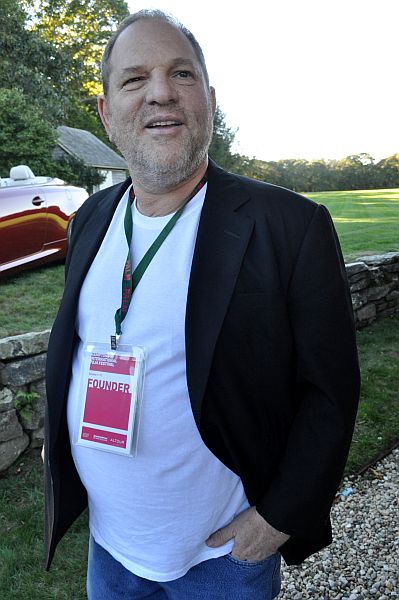Forget hurricane Harvey – there is another Harvey in town, one whose decades-long trail of havoc will hardly get any relief. Enter Mr. Weinstein, CBE, a self-made man, known for his day job of producing and distributing films in Hollywood. Weinstein and his company Miramax left an imprint on the early 90s independent movie scene by heralding cinematic milestones, including Sex, Lies and Videotape, The Crying Game, Pulp Fiction and Clerks (go see those movies if you have not), as well as ringing in the mainstream success of moviemakers, such as Silent Bob, Steven Soderbergh and Quentin Tarantino. While the big sharks eventually swallowed Miramax, Weinstein produced a decent heap of Oscar-worthy material, becoming a ubiquitous movie mogul in the process.
At its essence, a fairly unremarkable story – a boy with a passion for movies turned his passion into money. (American) dream come true. Yet, as it became clear, Mr. Weinstein had another equally strong passion that largely escaped the public eye. A report by the New York Times in October 2017 detailing the intensity of this passion made his story decidedly more interesting (and disturbing).
Weinstein, it turned out, had an alleged penchant for personally checking the potential of the budding female movie stars he produced, oftentimes in private settings and using a technique identified in knowing circles as “casting couch auditions”. During the following unravelling, all sorts of upsetting accounts, from awkward encounters to full-on harassment, coming from a staggering list of victims, bubbled up to the surface, shocking churchgoers in Texas. Weinstein’s career, it seemed, was indeed nothing more than sex, lies and videotape.
Better still, Weinstein’s demise has opened the floodgate for a global wave of revelations and discontent, the likes of which have never been seen in the history of Internet. Amidst the ongoing #MeToo campaign, hundreds of personal stories have started pouring in from all corners of the Western world – the issue has become politically salient even in Europe, where 57 out of the 750 members of the European Parliament attended an emergency discussion on the problem on October 25th.

Getting back to the source, two aspects of the Weinstein story strike us as particularly useful in making sense of the situation. First, as sources suggest, these were not the antics of a dirty old man, which were unrelated to his professional endeavors. How an actress reacted to Weinstein’s non-formal advances might very well determine whether she ended up in a movie or not. On the receiving end Weinstein, as he declared during one of his private sessions, was “used to it”, inviting discussion on the extent to which this model of recruiting aspiring actors has been embedded into the empire he established.
Another funny-but-not-so-funny aspect was how smoothly this scheme was running over decades through input by various enablers: everyone from the board members of Weinstein’s companies and colleagues in the business to employees and the affected women themselves were often turning a blind eye, helping, indirectly or not, the system to be kept well under wraps.
Sorting out the bits and bobs, we cannot help but think that Weinstein’s tale is the perfect caricature of the extremely crooked lenses through which social advancement is nowadays measured.
Sorting out the bits and bobs, we cannot help but think that Weinstein’s tale is the perfect caricature of the extremely crooked lenses through which social advancement is nowadays measured. Lenses pegged to the pack mentality exhibited by our (not so) distant canine cousins. Matching Weinstein’s predatory instincts, in pack hierarchies alpha males are entitled to privileges, including unrestrained and immediate access to female attention, by virtue of their ability to generate well-being for the pack. Facing the risk of exclusion, the rest of the pack members – the betas, gammas and so on – do not get to question the alpha male’s decisions.
Applied to Weinstein’s case and accounting for recent societal evolution, including Calvinist work ethic and neo-liberal division of labor, the pack concept helps paint a disquieting picture. As we have become cultured enough not to determine our rank through physical domination (a recent feat of humanity), and having switched from food and shelter to wherewithal (also not universally widespread), presently how we score in the hierarchies we are part of seems to be predicated by our ability to generate monetary wealth. The more cold cash we are able to secure the higher in the hierarchy we will be, and the alpha male is the winner who takes all.
Moreover, as illustrated by the Weinstein scandal, we also seem to have attuned our moral compasses to that core law. Thus, a man of wealth would be intrinsically seen as good and hard-working folk, while a man whose financial fortunes are less clear-cut would be considered а crooked chair warmer. Based on one’s money generation abilities, a person at the top will be granted moral authority – he will be considered universally right, and as such, exempt from public scrutiny. A position one will vehemently deny to any potential challengers until circumstances arise, making the granted exemption impossible to sustain.
It follows that this is not just about a lewd, power-hungry bigwig, be it Weinstein, the current US president or the next alpha predator, riding the wave of one’s economic or social status. In a broader sense, Weinstein-come-Trump represents any hierarchy that has been around too long – the status quo, an iron triangle or a hardened equilibrium: whichever social theory term you would want to draw on. Across the globe, on top of every wealth distribution system sits a Weinstein, making the decisions and expecting society to thank him by supplying fresh blood to his urges – a God in the making.
The big question is, therefore, whether the current backlash against Weinstein and a growing list of accomplices signifies the mere change of the upper echelon of a well-established industry or a deeper shift – one dealing with the models of social rank and mobility, prevalent in Western societies. We certainly hope for the latter, but are tempted to withhold the benefit of the doubt.
Header photo credit: Mihai Sardu; Licence: Unsplash










